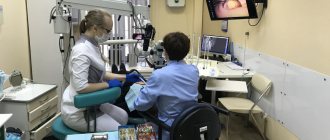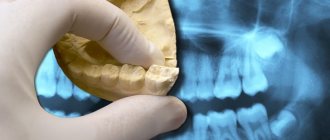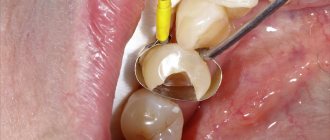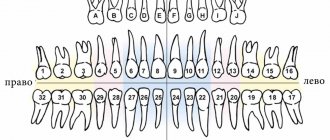Dentists receive qualification categories in the same way as doctors of other specialties.
See also the dentist's workplace documentation.
There are second, first and highest categories. In this article you will learn about the new procedure for obtaining qualification categories, according to Order No. 274 “On the procedure for obtaining qualification categories by employees with higher medical education, higher and secondary pharmaceutical education in state health care institutions.”
Dentist and dentist: what is the difference
Let's figure it out. What is the difference between a dentist and a dentist?
Dentist is a profession that requires secondary education. After graduating from medical school, the newly minted dentist specializes only in the treatment of hard dental tissues, namely dentin and enamel. Consequently, he will not be able to help a patient who comes with acute pain. His narrow specialization is based on the treatment of common caries.
A dentist is a medical specialist who has 6 years of university education and a year of internship behind him. He is endowed with a wide medical specialization and is able to perform various manipulations in the oral cavity: treatment and extraction of teeth, insertion of dental implants, bite straightening and much more.
The difference between a dentist and a dentist is obvious and quite significant. In this case, the question arises: why is a dentist needed if his powers are not as broad as those of a dentist?
In dental clinics there is no profession of “dentist” as such. There are quite a few highly specialized dentists of various specialties there. In addition, the dentist cannot be left as an on-duty specialist, since if necessary, he will not be able to provide the necessary assistance to the patient.
Having found out the difference between a dentist and a dentist, the advantage of the second specialist becomes obvious. That is why oral health should be entrusted to a doctor with a full university education.
What should be contained in a dentist’s report for the category
Now let’s take a closer look at what a dentist’s report should contain in order for the commission to assign the maximum score when assessing it. The report should contain the following sections:
- general introductory information about the doctor and his place of employment;
- extended information about the specialist;
- information about the dentist’s work activity over the last 1–3 years – depends on the doctor’s education;
- a list of state laws and regulations of the Ministry of Health, which the dentist is guided by when working;
- list of scientific publications of the specialist.
Introduction and brief information about the specialist
This part of the report should be no more than one printed page. The doctor should briefly talk about the specifics of his work and professional achievements. We recommend that in this section you mention a list of completed courses and educational advanced training programs, talk about awards and other facts of professional pride.
You also need to provide information about the place of work: name of the medical institution, number of structural units, types of services provided. It would not be superfluous to provide information about the technical equipment of the organization - whether the medical institution has modern equipment for research and high-tech dental procedures.
Information about professional activities
In the second section, the doctor must provide summary data on his activities over the last three years of work. The information should be presented in the form of a comparative analysis so that the commission members can clearly assess how the professional development of the dentist has progressed over the past years. We recommend using color infographics - charts, graphs, histograms with mandatory text explanations.
An additional advantage will be given to the report by information on the statistics of dental diseases that the doctor most often encountered in his work. The specialist can also describe his personal algorithms for diagnosing and treating dental diseases.
List of state laws and regulations of the Ministry of Health of the Russian Federation
This section of the report is needed to demonstrate to the commission a high degree of awareness in following current medical legislation. We recommend presenting information on this section in the following table:
- type of document - it can be an order, resolution, etc.;
- the competent authority that made the decision - the Ministry of Health, local or regional health department, Government, etc.;
- date, number and title of the document.
List of scientific publications
If a doctor applies for the highest category, he must submit a list of scientific works and publications. In support, it is also important to attach to the report copies of the pages of journals where the dentist’s articles were published.
Dentistry. Is it necessary?
The dentist deals exclusively with simple manipulations in the field of dental treatment. He does not have the right to provide more complex types of dental services.
Is this profession necessary then? The dentist performs the following list of works:
1. Examines the oral cavity and assesses the condition of the teeth.
2. Determines the cause of concern.
3. Treats gum diseases.
4. Engaged in filling small areas of damaged dental tissue.
5. Explains the rules of proper oral hygiene.
6. Consults on the choice of dental accessories, selects them based on the condition of the teeth.
7. If serious problems with the condition of the teeth are identified, refer the patient to an appointment with a competent specialist.
From the list of responsibilities, the need for the profession of a dentist is obvious, which makes it relevant.
However, this profession also has its downside: the lack of career prospects. Unfortunately, a dentist is not appointed to the position of head of the department.
Qualification categories of doctors: description and rules for obtaining
It is the responsibility of any medical practitioner to improve their knowledge and skills. Certification is considered one of the methods of training, which has its own requirements and characteristics, based on the results of which specialists are assigned the appropriate category. Each category of doctors occupies a certain level in the hierarchy of the medical field.
Goal and tasks
The participation of medical workers in certification is voluntary. In the process, the specialist’s personal worth, level of knowledge, practical skills, suitability for the position held, and professionalism are assessed.
Certification of doctors for a category carries with it a certain interest:
- It's prestigious. Allows you to occupy a higher position in a medical institution, allows you to draw the attention of management to yourself. Quite often, the categories of doctors are indicated on signs at the entrance to their office.
- In some cases, the highest category allows you to reduce moral or physical responsibility to the patient’s relatives. Like, if such a highly qualified specialist could not solve the problem, then it is difficult to think what would have happened if a less experienced doctor had been in his place.
- Material side. Medical categories of doctors and promotion through the levels of the medical hierarchy allow for an increase in the basic salary.
Types of certifications
The legislation distinguishes several types of certification activities:
- assignment of the title “specialist” after determining theoretical and practical skills;
- qualification category of doctors (obtaining);
- category confirmation.
Determining the level of knowledge for the designation of a “specialist” is a mandatory step before appointment to the position of a doctor. Conducted by special commissions in postgraduate education institutions. The following candidates will be considered:
- after internship, master's degree, residency, postgraduate study, if there is no diploma “doctor-specialist”;
- those who have not worked for more than 3 years in a narrow specialty;
- those who did not undergo certification in a timely manner to obtain qualifications;
- persons who are denied the opportunity to receive the second category for objective reasons.
Each doctor has the right to receive a category in several specialties at the same time, if they are related. The main requirement is work experience in the required specialization. The category of general practitioner is an exception.
Basic rules and requirements
There are second, first and highest categories of doctors. There is a rule of consistency in receiving, but there are exceptions. The requirements are discussed in the table.
| Qualification category of doctors | Outdated requirements | Requirements for current orders |
| Second | 5 years of practicing experience or more | At least 3 years of practical experience in the specialty |
| Submitting a work report | Personal appearance, including participation in report evaluation, interview, testing | |
| First | Department Head or Leadership level required | At least 7 years of practical experience in the specialty |
| Upon receipt - appearance, confirmation occurs in absentia | Personal appearance, including participation in report evaluation, interview, testing | |
| Higher | Manager position required | More than 10 years of practicing experience in the specialty |
| Personal appearance in any case | Personal appearance, including participation in report evaluation, interview, testing |
Validity periods
The certification category of a doctor is valid for 5 years after signing the order for its receipt. After time has passed, the specialist must confirm the current category or receive another category.
According to the old orders, there were certain circumstances that were classified as social benefits and made it possible to extend the period of the current qualification. These included:
- pregnancy and child care under 3 years of age;
- a month after dismissal due to reduction;
- business trip;
- state of temporary disability.
The benefits are not valid at this time. The certification commission may decide to extend the validity period at the request of the head physician of the medical institution. If a doctor refuses to appear for the commission, his category is automatically removed after a five-year period from the date of assignment.
Documentation
Four months before recertification, the specialist must submit an application for confirmation or obtaining a higher qualification. Passport details, existing category and date of receipt, personal signature are indicated here.
A certification sheet and a report on the work done over the past few years, approved by the chief physician of the health care facility and the human resources department where the certified person works, are also filled out. Copies of documents on education, work history and assignment of current qualifications are also sent to the commission.
Attestation report
The introduction includes information about the identity of the doctor and the medical institution where he holds a position. The characteristics of the department, its equipment and staff structure, and the performance indicators of the department in the form of statistical data are described.
The main part consists of the following points:
- characteristics of the population undergoing treatment in the department;
- possibility of carrying out diagnostic measures;
- carried out medical work with the indicated results for specialized diseases;
- deaths over the past 3 years and their analysis;
- implementation of innovations.
The conclusion of the report consists of summarizing the results, indicating possible problems and examples of their solutions, and opportunities for improvement. If published materials are available, a copy is attached. A list of literature used and studied over the past few years is indicated.
Points for promotion
Each specialist receives points that are used in making decisions about qualifications. They are awarded for attending conferences, including international congresses, giving lectures to colleagues or nursing staff, distance learning with a final certificate, and taking courses.
Additional points are awarded for the following achievements:
- publishing of textbooks, manuals, monographs;
- publication of an article;
- obtaining a patent for an invention;
- presentation at symposiums with a report;
- speaking in institutions and the media;
- obtaining a title;
- defense of the thesis;
- awards by public authorities.
Composition of the commission
The commission consists of a committee, whose work takes place during breaks between meetings, and a narrowly focused expert group, which directly conducts certification of a specialist (exam, testing). Both the committee and the expert group consist of persons holding the following positions:
- The chairman, who oversees the work and divides responsibilities between the members of the commission.
- The deputy chairman performs the functions of the chairman in full in his absence.
- The secretary is responsible for registering incoming documents, preparing materials for the work of the commission, and recording decisions.
- The deputy secretary replaces the secretary and performs his duties during absence.
Each expert group includes specialists from related specialties. For example, the category of dentist and its receipt/confirmation requires being in the group of a periodontist, orthodontist, pediatric dentist, or therapist.
Order of the meeting
Certification is scheduled no later than three months from the date of receipt of data about the specialist by the committee. If the data does not match the requirements for the latter, the documentation will be refused (no later than 2 weeks from the date of receipt). The secretary of the committee agrees with the chairman of the expert group of the required specialization on the date of the examination.
Members of the expert group review the certification works of doctors for the category, completing a review for each of them, displaying the following data:
- level of practical skills of a specialist;
- participation in social projects related to the medical field;
- availability of published materials;
- self-education of the certified person;
- compliance of knowledge and skills with the declared category of doctors.
The examination must take place within two weeks from the date of receipt of the report. The result of the review is an indicator of the possible outcome of the certification.
The secretary informs the specialist of the date of the meeting, which includes an interview and testing. More than 70% of correct answers allow you to consider the test passed.
The interview takes place by questioning the person being certified according to theory and practice, the knowledge of which must correspond to the requested qualification.
The meeting is accompanied by the preparation of a protocol, which is signed by the members of the expert group and the chairman. The final decision is noted on the qualification sheet. A specialist receives the right to retake the exam only after a year. Within 7 days, the certified person receives a document confirming the promotion, reduction or refusal to assign a category.
Protest
From the date of the decision, the doctor or medical institution can appeal the result within a month. To do this, it is necessary to fill out an application specifying the reasons for disagreement and send it to the commission under the Ministry of Health.
Source: https://FB.ru/article/260066/kvalifikatsionnyie-kategorii-vrachey-opisanie-i-pravila-polucheniya
Categories of dentists
To improve his specialization, after a certain amount of time, the dentist must upgrade his category.
The category depends on the length of work in the specialty, starting from the moment it was received. They are changed after completing advanced training courses.
There are 3 categories of dentists:
1. Doctor of the second category - awarded to a doctor whose work experience is more than 3 years, after receiving certification. The specialist must be well-versed both theoretically and in terms of practice.
2. Doctor of the first category - work experience of at least 7 years. A specialist must increase knowledge in his field, as well as study related disciplines.
3. The highest category implies at least 10 years of work experience in the specialty. This category corresponds to advanced theoretical and practical training.
A doctor’s category affects not only his professionalism, but also his salary.
Obtaining the dentist category
Obviously, to obtain a category, experience is key. But simply completing training as a dentist and then working in your specialty will not work. Regular advanced training, retraining and constant updating of knowledge will be required. And, of course, this is not a guarantee, because the decision to recognize a specialist as an even greater specialist is not made automatically, but on the basis of the decision of the certification commission.
If a specialist is confident that he can qualify for an increase in his category, he needs to prepare the following documents:
- application addressed to the chairman of the local certification commission. It must indicate which qualification category the specialist is applying for, whether he has already assigned categories, if so, then its date must be indicated;
- a printed qualification sheet, which is certified by the human resources department of the medical institution where the specialist works;
- certification report on professional activities, which must be agreed upon with the specialist’s supervisor and certified with a seal. This report includes an analysis of the doctor's professional work activity over the past 3 years.
The report should look like this:
- The first chapter includes information about the medical institution where the dentist works, about the dental department of this institution, the technical equipment of the dental office and, directly, the doctor’s workplace.
- The second chapter contains a report on the dentist’s activities for three years. Here it should be analyzed what the dynamics of the work are, whether it is positive. It should be covered how a dentist masters modern technologies and treatment methods. It also provides statistics and qualitative and quantitative performance indicators in the form of tables or graphs. Brief conclusions (1-2 sentences) should be drawn for tables and graphs. It would be welcome if it is mentioned what treatment methods the specialist uses in his work.
- The third chapter contains an analysis of new methods of prevention and treatment.
As you can see, the category of dentist is not a standard stage in the life of a specialist, but significant work that involves not just work experience, but also constant training throughout the entire period of one’s career. And yet, for a dentist, the category is an opportunity to celebrate high professionalism in one’s life. Therefore, it's worth it!
Children's doctor
A pediatric dentist treats simple dental problems that arise in children. As a rule, this is caries that develops in young patients due to a sweet tooth.
However, there are often cases when a pediatric dentist is not able to provide qualified assistance to a child, and he has to refuse to treat the patient. There are several reasons for this:
• Problems in the treatment of children's teeth due to the differences that a child's jaw has compared to an adult's.
• Dental treatment may require special equipment and a different approach that the dentist does not have.
• Lack of drugs suitable for children.
• Inability to find an approach to a small patient.
If the pediatric dentist is unable to provide the necessary care to the child, you must make an appointment with the pediatric dentist.
In most cases, a pediatric dentist is able to help a small patient, since the oral cavity of children is more often susceptible to ordinary caries, which requires simple treatment. Also, do not forget to take your child for a preventive examination twice a year.
What types of dentists are there?
The vast majority of dentists are general practitioners, that is, therapists or simply dentists.
They perform routine examinations, routinely diagnose patients, perform root canals, and install fillings.
These specialists should also be contacted if you need to install dentures, crowns and bridges. They will prepare the patient for surgery, which will be performed by the surgeon.
Some of the dentists perform procedures in the field of cosmetic dentistry. Dental therapists are qualified to treat patients of all ages. Other professionals work in certain specialized areas.
Types of dentists
Orthodontists
An orthodontist is specially trained to care for patients whose teeth need straightening. These professionals install braces and other orthodontic devices to improve the function and appearance of teeth. Orthodontists work with both children and adults.
Endodontists
Endodontists specialize in working with the tissues surrounding teeth. They regularly perform complex procedures, including providing root canal treatment, which involves removing tissue, filling the space, and then sealing it. This procedure allows you to save teeth that would otherwise have to be removed.
Dental surgeons
Oral and maxillofacial surgeons are used to treat diseases and injuries of the mouth or surrounding area. During their training, these highly specialized physicians improve their skills because their work often involves caring for patients who require anesthesia. They regularly perform complex operations related to problems not only of teeth, but also of the jaw.
It is within the framework of maxillofacial surgery that wisdom teeth are removed and implants are placed. Maxillofacial surgeons care for patients with oral cancer and may be called upon to perform complex surgeries on people with facial injuries.
Prosthetists
Prothodontists, orthodontists, or prosthetists work to create artificial teeth such as dentures, custom implants, and bridges. They can communicate with patients, participate in research and carry out orders related to the development of artificial teeth individually for each customer.
Children's doctors
Pediatric dentists treat children aged 0 to 18 years. Most patients see a pediatric dentist during adolescence, but congenital anomalies and problems with baby teeth are also an area of interest for such specialists. These dentists care about treating the unique dental problems that occur during childhood.
Periodontists
Periodontists undergo special training to fully treat diseases that occur in the gum area. Highly qualified specialists are hired to treat diseases of the gums and surrounding areas of the oral cavity.
They also perform dental implant procedures and monitor the health of patients suffering from bone loss near the teeth.
The ultimate goal of a periodontist is to preserve teeth by treating problems with the gums, tooth roots, or skeletal system.
Dental radiologists
By specializing in oral and maxillofacial radiology, dentists are able to perform instrumental diagnostics. The resulting images allow you to assess the condition of your mouth and teeth. You can get a referral to a radiologist from a general dentist, surgeon, prosthetist, or any other doctor.
Laboratory assistants and diagnosticians
Diagnostic dentists work in the field of maxillofacial pathology. They extract facts about dental diseases using a microscope, clinical examination, radiology and other means.
These specialists are detectives from the world of dentistry, as they search for the cause of certain patient symptoms. The doctor can find the underlying cause of pain, infection and inflammation.
He may treat patients with complex diseases or work in research laboratories.
Forensic dentists
A forensic dentist participates in autopsies, examines knocked-out teeth, and provides examination of remains. These specialists help determine causes of death and identify individuals by examining teeth.
Public health dentists develop health programs and conduct research to determine the best ways to provide dental care. They are interested in the control of dental diseases and current treatments for diseases.
In large dental clinics, several highly specialized professionals may be attending at the same time. For the normal functioning of such an institution, it is enough to involve a therapist, surgeon, orthodontist, periodontist and prosthetist in cooperation. Some dentists pursue training in multiple fields at the same time to broaden their professional skills.
Source: https://big-book-med.ru/kakie_byvayut_vidy_vrachey_stomatologov/
Dentist
A dentist has a wider range of powers in the field of dental treatment than a dentist. During 6 years of university training, in addition to studying “dental” topics, dentists master a number of other important disciplines that improve the training of a future specialist.
Upon completion of training, doctors are invited to choose one of several specializations in dentistry:
• Dentist-therapist.
• Periodontist.
• Orthodontist.
• Dental surgeon.
• Prosthetist.
• Pediatric dentist.
Dentist-therapist
The activities of this specialist are the same as those of a dentist, but the dentist-therapist is vested with a wider range of powers:
• Treatment of more acute dental problems.
• Filling of teeth in case of severe destruction.
• Treatment of inflammatory diseases of the gums, oral mucosa, tongue.
• Teeth whitening.
• Ultrasonic cleaning.
• Conducting preventive examinations, followed by recommendations.
Dental surgeon
Dental surgeons are competent in the following matters:
• Removal of diseased teeth that cannot be restored.
• Removal of healthy teeth that are interfering with the growth of adjacent units.
• Implantation, prosthetics.
• Correction of the dentition.
• Carrying out a number of operations, for example, incision of the gums, resection of tooth roots.
The difference between a dentist and a dentist is worth knowing for those who have decided to devote themselves to this profession.
A dentist, endowed with a minimum set of medical powers, still remains a sought-after specialist. It is especially in demand in small provincial towns or villages, where, in the absence of dentists, the dentist copes with the treatment of various diseases.
Who are dentists?
In the field of dentistry, there is another concept - dentist. How is he different from a dentist and a dentist?
Essentially, a dentist is a dentist (corresponding to a medical assistant). This concept applies to dental professionals working abroad. It has not taken root in our country. And many people have heard the word “dentist” only in foreign films; in everyday life it is “unheard of.”
Since a dentist is the same as a dentist, dentists are therefore mid-level doctors, that is, without a full higher education and with a limited range of services provided.
So, having figured out who a dentist and a dentist are and realizing that these are specialists in the same medical specialization, but with different tasks, you can easily contact a dental clinic for help if the need arises.
It is worth considering that there is also a difference between a dentist and a dentist in the prices for services. Dentists' prices will be significantly higher than the price for dentists' work.
Now we know who a dentist is. We also looked at what it does and its relevance, so you can safely contact any clinic, having the right concepts about dentists and dentists.
Certification of medical workers in 2021-2022: legal basis
Certification of medical workers in 2021 - 2022 , as before, is regulated by a special regulatory legal act - Order of the Ministry of Health of Russia dated April 23, 2013 No. 240n, which determines the procedure and procedure for obtaining categories.
A draft regulatory act is being considered that would establish a new procedure for the certification of health workers. Main innovations (in comparison with the procedure under Order No. 240n):
- the possibility of submitting an application for certification regardless of the time spent working in a medical organization;
- establishing a standard according to which a work report will be provided for a period that was not previously assessed during certification;
- the emergence of the opportunity to send documents to the certification commission in electronic form.
Public discussion of the project should be completed by November 22, 2021.
One way or another, for now the procedure under Order No. 240n is in effect, the same for persons with higher and secondary education. Wherein:
- specialists with higher medical and pharmaceutical education are certified according to the nomenclature of specialties from the order of the Ministry of Health of Russia dated October 7, 2015 No. 700n;
- specialists with secondary medical education - according to the nomenclature from the order of the Ministry of Health and Social Development of Russia dated April 16, 2008 No. 176n;
- specialists with other higher professional education - by position according to the nomenclature approved by order of the Ministry of Health of Russia dated December 20, 2012 No. 1183n.
The resulting category is valid for five years from the date of issue of the order for its assignment. A specialist can take an exam for a higher category no earlier than three years after receiving a valid one.
At the beginning of 2022, the Ministry of Health issued an order No. 41 dated 02/02/2021, regulating the certification of health workers and pharmacists to obtain a qualification category. In accordance with clause 1 of the document, their certification is suspended until 01/01/2022 (with the exception of certification for the assignment of a qualification category for the first time, as well as a higher qualification category). And in accordance with clause 3 of the document, the validity of qualification categories is extended by 12 months upon expiration of their validity period from January 1 to December 31, 2021.
ConsultantPlus experts have prepared special material for you about the features of certification of medical workers in 2022. Get trial access to this legal reference system for free.
IMPORTANT! “Certification” order No. 240n came into force on 08/04/2013. Categories assigned before this date continue to be valid for the entire period for which they were assigned.
There are 3 qualification categories in total:
- second;
- first;
- highest.
For each of them, Order No. 240n sets out the requirements for the experience, knowledge and skills of a medical specialist.











